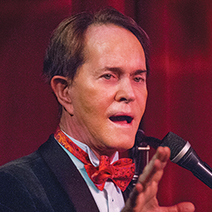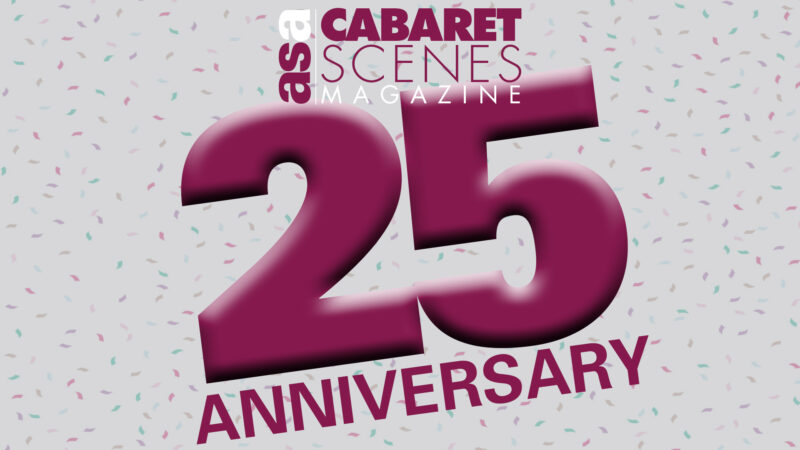Steve Ross
I Remember Him Well: The Songs of Alan Jay Lerner
Birdland, NYC, January 22, 2018
Reviewed by Alix Cohen for Cabaret Scenes

Like Fred Astaire, with whom I’m comfortable comparing him, Steve Ross is a songwriter’s singer. Lyrics arrive unobscured with heart, finesse, comprehension, and a lifetime of experience. If you want to really hear a song, listen to a Ross version. To this he adds consummate musicianship, enhancing a number even when offering a new take on its arrangement.
Tonight Ross is as playful as I’ve seen him, a veritable troubadour. The artist enters—microphone in hand— performing a cappella to audience members at the front of the packed room: “You’re like Paris in April and May/You’re New York on a silvery day…” then sits at the piano. Fred Astaire sang “You’re All the World to Me” while dancing on the walls and ceiling of his hotel room in Royal Wedding. YouTube the joyful sequence if unfamiliar (music: Burton Lane).
“This is going to be a banner year for Alan Jay Lerner. He had a lifelong romance with the English language…musicals…long ago and far away romance.” Ross begins with the lyricist’s fondness for growing things. “I Never Met a Rose” (The Little Prince with Frederick Loewe) is wistful, cottony, charming. “I have even met a violet (he rises from the piano bench slightly) who satisfied me…perhaps the trouble is, who knows/that I never met a rose…”
“I Talk to the Trees” (Paint Your Wagon; Loewe) sways, dips and flutters as if it had marabou on the hem of its dress. “How many songs can you name that deal directly with accelerated plant growth?” prefaces “Hurry! It’s Lovely Up Here” (On a Clear Day You Can See Forever; Lane). Instead of the usual, strictly musical rendition, Ross actually encourages/attempts to convince. “Open up and spread out,” he suggests, sweeping his right arm from the keys. Accompaniment becomes uptempo, then returns to enticing ease and a wink.
We’re also treated to the title song from Clear Day. “Over the years, I realized this could be a statement about self-realization.” It apparently took Lerner, who was fascinated by the occult, many, many months to write this particular lyric—racking up 91 versions! He gave it three hours every morning before going on to the rest of the show. Piano begins like a breeze through hanging chimes. Then, imagine tall reeds gracefully bending in that breeze like synchronized dancers. It’s magical and balletic.
“If Ever I Would Leave You” (Camelot; Loewe), one of several high points, is suffused with longing. The character knows he must go. I don’t think I’ve ever heard it this touching. In the last few years, Ross has brought forth an interior note extension, almost like humming that emanates from the back of his throat, connecting phrases, making everything more lyrical. It’s just beautiful. No matter how many times I attend a show by this artist, he moves me.
As is signature with Steve Ross, selections from several lesser-known musicals are covered. There are some from Carmelina (Lane)—based on the Gina Lollobrigida film Buona Sera Mrs. Campbell in which, after the war, our heroine tells three different soldiers her daughter is theirs (Mamma Mia!, anyone?). Of these, “One More Walk Around the Garden” is most memorable, evoking faded photographs and delicate, pressed flowers with muted glow.
Numbers from the never-produced “My Man Godfrey” (with Gerard Kenny) include “Try Love”: “When you’ve done it all/And ordinary pleasures aren’t fun at all… my love/If you ever try love/Try me…” which would sound insubstantial performed by a young man; “Dancing the Blues Away” with a terrific, vaudevillian tap arrangement; and the extremely wry and clever “I’ve Been Married.” Where else would we be exposed to these?
There are also songs from Brigadoon and Gigi (Loewe). Ross can talk/sing, when he chooses, like few performers—the song never losing out. Recitation of a lyric tonight is spot on. An attempt at playing both characters in a parlando. “I Remember It Well” from Gigi, however, is unsuccessful.
Guest Shana Farr enters with a deftly phrased “Here I’ll Stay” (Love Life with Kurt Weill), and duets with Ross on several songs. Contributions from My Fair Lady”(Loewe) powerfully soar. (Did you catch her Julie Andrews evening?) “Show Me” erupts spitfire; “Say one more word and I’ll scream” is practically sung through clenched teeth. An ebullient, vivacious “I Could Have Danced All Night” sends chills up one’s spine.
The iconic show, previously attempted as a musical by Dietz & Schwartz, Comden & Green, and Cole Porter, ran 6 ½ years on Broadway “and has been done everywhere except under water. Even Lerner’s own mother asked ‘What can you do after this?” (Ross)
We close with an organic musical/lyrical sequence: “Too Late Now” (Royal Wedding)—a lilting lament; “What Did I Have That I Don’t Have?,” which emerges resigned, melancholy, bordering on blues; and “Come Back to Me” (both from Clear Day…) which starts as a dramatic recitation. There’s a message implicit in this last: We’ve had a good time. I love you too. Come again.
The whole room (without printed lyrics) joins Ross in “Wouldn’t It Be Loverly?,” the perfect ending to a loverly show.





